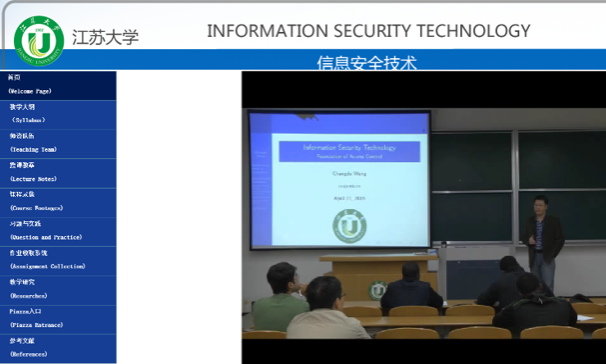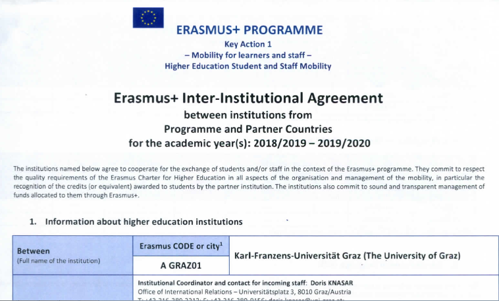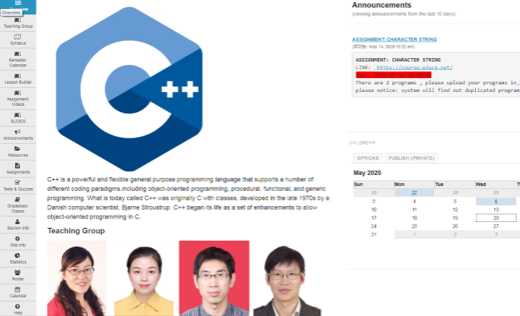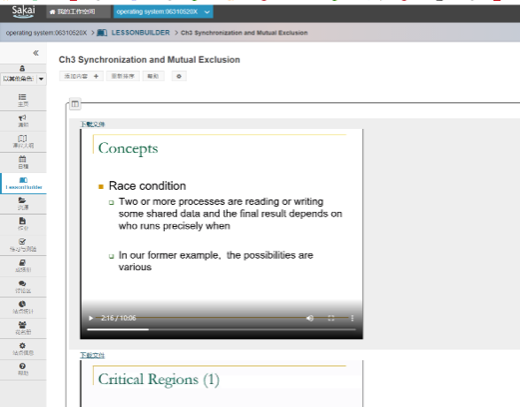National Excellent Course
‘Information security technology’
This course aims to introduce the core concepts of Information Security. Through learning of this course, students will understand the basis of the principle of information security, the core the algorithms of access control and cryptographies and the protocols of key distribution.


Provincial Excellent Courses
‘ Programming in C++’
C++ language is a widely-used object-oriented programming language, which can realize the object-oriented program design. This language is suitable for writing both application software and system software. This course systematically and comprehensively tells the basic concept of C++ language, the basic grammar and programming method, describes the object-oriented characteristics of C++ language in detail, such as class and object, inheritance, and derived class, polymorphism and virtual function etc.


‘Operating System’
The operating system is an indispensable basic system software in a computer system. It is used to manage and control the software and hardware resources of the computer system, and to provide user interaction interfaces. It is the soul and core of the computer system. "Operating System A" is an important professional basic and compulsory course for computer science and technology majors, and it has a very important position in the entire teaching system. As one of the core courses of computer science and technology, this course not only helps students master the basic concepts, principles and design methods of operating systems, but also cultivates students the capabilities of software design and development and computer system management and maintenance.
University Excellent Courses
‘Assembly Language and Microcomputer Interfacing’
It is a compulsory course for computer science and technology majors. This course systematically introduces the internal structure of Intel 16 bit CPU 8086 / 8088, the design of assembly language program, the main characteristics and application methods of typical interface chips, and establishes the overall concept of microcomputer system. The purpose of this course is to make the foreign students master the assembly language programming of PC platform, the software and hardware design technology of various common I / O interfaces, and cultivate the analysis and design ability of the foreign students' microcomputer system, as well as the application ability of solving complex engineering.
‘Data Structure’
It is a comprehensive basic course in computer science. It is the base not only for general program design but also for operating system design and implementation, database system, complier programs, other system and application programs.In this course, we discuss the logical structure, storage structure and the algorithm of some related operations in a variety of data organizations. The purpose is to let the student learn to analyze data features, gain the knowledge of data organization, data storage and processing data, and strengthen the ability in choosing appropriate data structure and algorithms for practical application.
'Discrete Mathematics'
Discrete mathematics is an important branch of modern mathematics and it targets on the structure of discrete quantities and the relationship between them. Its studying objects are generally finite or countable elements, which embodies the characteristics of discreteness of computer science. Discrete mathematics is the core curriculum of the basic theory in computer science. This course is a basic and compulsory course in computer science and technology major and has a close relationship with data structure, operating systems, compiler theory, algorithm analysis, logic design, system structure, fault-tolerant diagnosis, machine theorem etc. The mission of this course is to let the student learn and master the basic theory and knowledge, deeply understand the theory of analyzing and solving problem of discrete mathematics and lay a good foundation for the study of follow-up courses.
'Compilers'
Programming languages are notations for describing computations to people and to machines. The world as we know it depends on programming languages, because all the software running on all the computers was written in some programming language. But, before a program can be run, it first must be translated into a form in which it can be executed by a computer. The software systems that do this translation are called compilers. This course is about how to design and implement compilers. We shall discover that a few basic ideas can be used to construct translators for a wide variety of languages and machines. Besides compilers, the principles and techniques for compiler design are applicable to so many other domains that they are likely to be reused many times in the career of a computer scientist. The study of compiler writing touches upon programming languages, machine architecture, language theory, algorithms, and software engineering. Technology of Compilers is a core course for computer science and technology majors, with strong theoretical, practical and technical nature. Its task is to enable students to master the basic theories, design ideas and implementation methods of compilers, cultivate students' abstract thinking, analyze problems and solve problems, so as to lay a certain theoretical and practical foundation for the development of application software and system software in the future.
'Maching Learning'
Machine learning is a compulsory course for undergraduate majors related to computer science and technology, intelligent science and technology and other related majors. Python language is a very popular object-oriented programming language at present. It has the advantages of easy to learn and use, rich available library resources and high development efficiency. It is widely used in the development of web background programs, programs of Internet of things terminal devices and gateway devices, artificial intelligence programs and so on. By learning the programming method of Python language, on the basis of mastering the basic development of python, this course learns to understand the basic problems and basic algorithms of machine learning and master their practical methods. This course has a wide range of knowledge, deep technology and strong practicability. Through the study of this course, students can lay a good foundation for the analysis, development and application of various applications, large-scale complex software systems, artificial intelligence and robot systems in the future.
Specifically, first, master the knowledge of Python language, the idea of object-oriented programming, the use methods of various Python program libraries and visual programming means, so as to enable students to understand the machine learning algorithms related to clustering, regression, classification and annotation and master their application methods; Understand probability models and master their application methods; Understand the basic knowledge of machine learning such as distance measurement, model evaluation, over fitting and optimization; Master the application methods of machine learning engineering, such as feature engineering, dimension reduction and super parameter optimization; Understand neural network models and deep learning models.
'Programming in F(C)'

